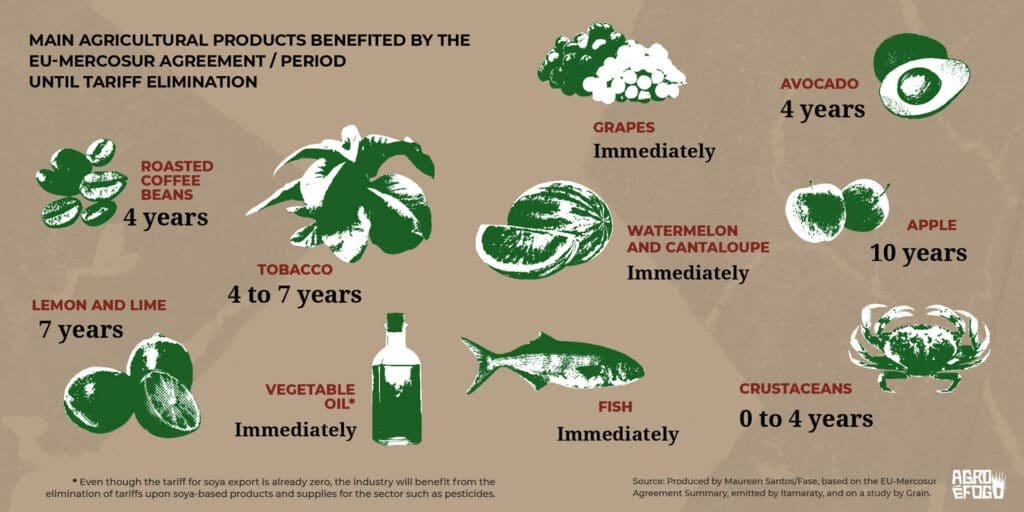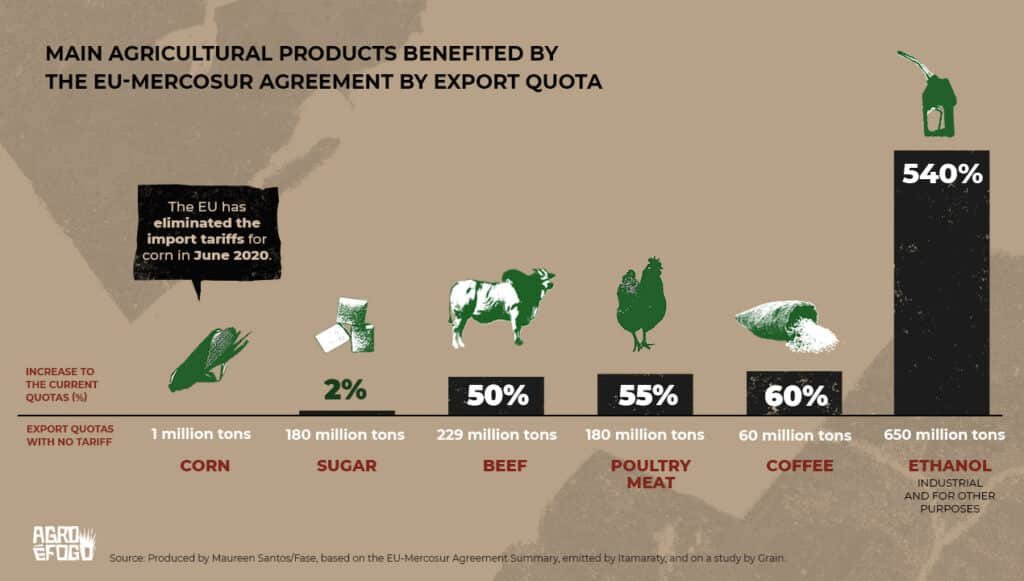The EU-Mercosur Agreement: Fuel for Destruction of the Amazon, Cerrado and Pantanal
By Maureen Santos
We face terrible times in Brazil, where social and environmental devastation goes hand in hand with democratic setbacks, eroding accomplishments made and rights conquered over many decades. As if this milieu of the country’s destruction were not enough, the federal government has been negotiating international deals that may fuel the devastation , with serious consequences to several Brazilian ecological regions, especially the Amazon, Cerrado and Pantanal.
One of the most detrimental deals is the European Union-Mercosur Association Agreement. For over twenty years, negotiations have been based on three key pillars: free trade, cooperation and political dialogue. Negotiations wrapped up in June 2019, but recent obstacles have held up the signing and ratification process. For Mercosur, obstacles include political distance between Brazil and Argentina, and Uruguay’s determination to unilaterally negotiate other agreements. For the EU, obstacles include domestic pressures from certain industries, such as small and mid-size farmers, that stand to be negatively impacted by the agreement, as well as pressure from members of parliament and civil society organizations who have criticized the lack of an environmental clause or stricter measures[1] for environmental destruction on account of the exponential increase in deforestation of the Brazilian Amazon.
Of the three pillars, the free trade agreement is the one that bears the greatest social and environmental impact since it regulates much more than trade in goods. Topics such as services, government procurement, intellectual property, climate and the environment all fall under the heading of “free trade.” The document’s text consists of seventeen chapters and anticipates a reduction of trade tariffs, the expansion of import and export quotas and the elimination of non-tariff barriers[2] within 15 years for Mercosur’s primary agricultural and mineral commodity exports (corn, meat, sugar, ethanol, iron ore, rice, coffee, etc.) and for industrialized products from the European Union (cars, machinery and equipment, pharmaceuticals and agricultural products).
The agreement is patently imbalanced. It rests on trading high value-added goods from the EU for agricultural commodities from the Mercosur countries, whose GDP is seven times smaller than that of the EU. Sanitary and phytosanitary legislation in the Mercosur countries is also notably much weaker, and the region bends to the economic pressure of agro-industrial multinational corporations predominantly headquartered in EU countries. Thus, even if Mercosur stands to gain economically with the opening of the European market (as a large part of the Mercosur’s GDP stems from commodity exports), the gains will be much smaller than the 4 billion Euros in customs tariffs that EU exporters stand to save precisely because of existing asymmetries.[3]
Notes
There are several ongoing debates on how to incorporate environmental measures, ranging from renegotiating the agreement, adopting an annex, or even splitting the agreement and passing only the part concerning trade. The European Parliament expressed its disappointment on Brazil’s environmental track record by including an amendment to its October 2020 Annual Trade Report with the sentence “The Association Agreement between the European Union and Mercosur cannot be ratified as it stands.” See more.
In the agreement, elimination of non-tariff barriers is addressed in the following chapters: Sanitary and Phytosanitary Measures (SPS) and Technical Barriers to Trade. This measure is designed to expedite procedures by reducing timeframes or by establishing fixed timeframes, ending individual inspection of agricultural products, and standardizing procedures, among other measures.
Gregosz, David (2020). Acordo UE-Mercosul: Nova era glacial ou surpreendente avanço após a pandemia do novo coronavírus? In: O novo acordo Mercosul-União Europeia em perspectiva. Rio de Janeiro: KAS, p. 46. Accessed 7/28/21.
The agreement will benefit agribusiness and increase destruction
Brazil is the European Union’s largest trading partner and its second largest supplier of agricultural products. Therefore, if there is one sector that will directly benefit from the agreement ratification, it is Brazilian agribusiness. The infographics below show the expected positive impact of tariff eliminations and quotas for agricultural products exported by Mercosur countries once the agreement comes into force.
In Brazil, the agricultural products in the first infographic come predominantly from mid-size and large farms, and thus are expected to lead to several alarming social and environmental consequences, which are listed in the study published in the Lieri Bulletin[4]:
“(a) escalation of land conflicts, most notably pressure on lands held by indigenous people and traditional communities, such as the quilombola communities [peasant’s black communities, descended from enslaved people], babaçu coconut harvesters and others traditional extractive communities in the Amazon region;
(b) water disputes due to increased demand for water used in crop irrigation and cattle raising;
(c) deforestation and decreased biodiversity.”
Brazil’s main agricultural commodities are well covered by the agreement whose backdrop is anything but rosy: most land conflicts that undermine traditional peoples and communities involve the agro-industrial complex, which is one of the primary perpetrators of increased deforestation and greenhouse gas emissions. Thus, to what extent will the European Union-Mercosur Agreement not fuel the devastation of the Amazon, the Cerrado and the Pantanal regions?
Deforestation[5] and forest fires have experienced an unprecedented increase in recent years, and the federal government does not support measures to combat either threat; to the contrary, Congress and Jair Bolsonaro’s administration have been systematically dismantling the laws and policies designed to control such destruction[6]. The regions most affected are of paramount importance both for indigenous peoples, traditional communities, family farmers and peasants who live on the lands as well as for country-wide water supply and balance, which is essential for climate control and food production. The Amazon, Cerrado and Pantanal are highly connected, with important transition areas between them, sharing key water basins, and tremendous sociobiodiversity[7].
To illustrate, the days ultimately dubbed Amazon Fire Day in 2019 and Pantanal Fire Day in 2020[8] followed similar trajectories: they were both the result of criminal practices to legitimate land grabbing and to expand the production of cattle, soybeans, and other agricultural and mining commodities. These emblematic fires are in alignment with the initiatives of the federal government and its “arsenal of death,”[9] which has consisted, over the last two years, of both undermining Brazilian social and environmental legal milestones, land tenure laws and fundamental rights, with a discourse that patently encourages illegal activity.
A recent study has brought to light the extent of change within the Cerrado region: forests and pastures are being converted into croplands at a rate of 5,000 km² per year, making the savannah increasingly hotter and drier. Another factor contributing to this phenomenon are fires. Data from the National Institute for Space Research (INPE) have documented over 68,000 fires per year, 80% of which occur between July and October.[10]
Notes
Free translation. Porto, Silvio; Maluf, Renato; Cintrão, Rosângela (2019). Acordo de Associação entre o MERCOSUL e a União Europeia: alguns pontos críticos no âmbito agroalimentar. Boletim LIERI, n.3, August 2019. Available here.
See dossier article entitled “Presidência e parlamento a serviço dos grileiros: legislar para grilar.”
Paula, Franciléia; Tura, Letícia; Miliotti, Rosilene (2020). “Das nossas florestas só restarão as cinzas?”
Vechionne, Marcela; e Martins, Pedro (2021). “Desmatamento e pandemia: o que o Conselho Nacional da Amazônia está fazendo contra você”.
Hofmann, Gabriel S. et al. (2021). “The Brazilian Cerrado is becoming hotter and drier. Global Change Biology”, 1–14. p. 2.
The agreement includes no socio-environmental responsibilities and directly impacts traditional peoples and communities
The impacts referenced before simply do not factor in as a concern in the agreement. Although the trade agreement does include a chapter entitled “Trade and Sustainable Development,” the text itself is very broad, non-binding and does not provide for dispute settlement. This means there is no environmental clause in the agreement that holds the signatory countries responsible for compliance.
And interestingly, while the chapter on sustainable development does address compliance with the Paris Agreement, trade liberalization is bound to lead to a significant increase in greenhouse gas emissions and subsequently exacerbate the climate crisis. The impacts even run counter to efforts and commitments made by the signatory countries to the Paris Agreement through nationally determined contributions (NDCs). A study published in 2019 by Grain estimates that implementing the agreement will translate to approximately 9 million additional tons of greenhouse gases annually.[11]
Another industry set to benefit greatly from the agreement is mining. Iron ore and kaolin account for significant Brazilian mining exports; import tariffs for these minerals will ultimately be completely eliminated: 80% of the tariffs will be slashed as soon as the agreement is signed, and the rest will drop to zero within four to ten years. Agribusiness and mining are the two sectors that cause the most environmental destruction in Brazil and most profoundly undermine the rights of indigenous peoples and traditional communities living within or near operations.[12]
The EU-Mercosur Agreement has no safeguards for these impacts and brings to the fore a biased interpretation of the right to free and informed consent provided for in International Labour Organization (ILO) Convention 169. The eighth article of the agreement chapter on trade and “sustainable development,” although it does not cite the aforementioned convention directly, does state “each Party shall…. promote, as appropriate and with their prior informed consent, the inclusion of forest-based local communities and indigenous peoples in sustainable supply chains of timber and non-timber forest products.”[13] This, in fact, is a way to encourage corralling these peoples, their lands and territories under the domain of agribusiness, specifically as suppliers of products for the agro-industrial value chain. Thus, the right to resist, to form free and informed opinions about enterprises interested in operating in their territories, and to determine their own development priorities may all be impacted by the Agreement.
It is therefore clear that the EU-Mercosur Agreement will put pressure on the demand for commodity production for export and further entrench the current agro-industrial model, which is based on using genetically modified inputs and pesticides, on installing monoculture plants and concentrating lands, and on focussing on foreign markets, all to the detriment of family farms and peasant agriculture and to their diversified food systems.[14]
Notes
See dossier article entitled “MINING AND THE DEVELOPMENT OF UNDERDEVELOPMENT: The Minas-Bahia and Eastern Amazon frontiers”.
Fritz, Thomas. EU-Mercosur Agreement – Risks to Climate Protection and Human Rights. Brazil: FASE, Greenpeace, Misereor, DKA, CIDSe, 2020. Pg. 30; Santos, Maureen. O acordo União Europeia-Mercosul e a problemática relação entre clima e comércio. Fundação Heinrich Böll, 2019. Accessed 8/30/21.
Ponte, Emmanuel; Santos, Maureen (2021). O Acordo UE-Mercosul e o Cerrado. Le Monde Diplomatique, January 2021. See dossier article entitled “AGRO = HUNGER: The Erosion of Agrobiodiversity and Food Cultures”.
Maureen Santos is member of the FASE National Advisory Group and of the Brazilian Front Against the EU-Mercosur and EFTA-Mercosur Agreements.



